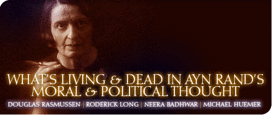I agree (1) with Rod’s response to Neera that happiness needs to be understood objectively and (2) with what he says about Michael’s concern re the plausibility of Rand’s general approach. Much of what Rod says in response to Michael was noted by Den Uyl and myself in our “Nozick on the Randian Argument” in The Personalist 59 (April 1978): 184-205 as well as in our account of her ethical views in The Philosophic Thought of Ayn Rand. But he makes these points well, and they are to my mind part of the life-based approach to natural teleology that we both champion.
I cited Cicero for his recognition that human flourishing is individualized and not for the problematic Stoic claim (made elsewhere) that universal rights (which may or may not be negative) follow from our rational nature.
I would think that if human flourishing is individualized and agent-relative,[1] then this would mean that human flourishing is different for each person, and thus it is possible for there to be conflict—that is, there is no way that one can in principle rule this out. For example, if Arizona University were considering only either Rod or myself for an endowed chair, then mutatis mutandis his good would be served better if he were chosen and I was not, and my good would be served better if I were chosen, and he was not. But all these sorts of things depend on numerous concretes (e.g., that it would be good for either of us to accept such a chair). Ethical principles do not specify such details, and this is again why practical wisdom is so important.
I do think that it is possible for people to cooperate peaceably. This is why basic negative rights are so important, but the issue here between me and Rand seems to be whether the existence of such rights depends on the assumption that what is objectively good for one individual cannot ever conflict with what is objectively good for another. I don’t assume this. She did.
Human beings are certainly social. Indeed, human reason has a social dimension, but I am afraid that I may have a different reading of the social nature of reason than Rod’s. It may come down to a disagreement regarding the views of Hilary Putnam and possibly the later Wittgenstein. (See my essay, “The Importance of Metaphysical Realism,” Social Philosophy & Policy 25.1 (Winter 2008): 56-99.) But now, we are getting away from Rand and talking more of our own approaches to these issues.
Surely, any philosopher’s work is incomplete. But Rand’s corpus is certainly nothing like that of Aristotle’s or Kant’s.
This has been fun. I want to thank Rod, Michael, and Neera for their comments. I learned a great deal.
Note
[1] “Agent-relative” describes any value, ranking, or reason V for which its description includes an essential reference to the person for whom the value exists, for whom the ranking is correct, or who has the reason. Thus, a good, G1, for a person, P1, is agent-relative if and only if its distinctive presence in a world, W1, is a basis or reason for P1 ranking W1 over W2, even though G1 may not be a basis or reason for any other person ranking W1 over W2.

